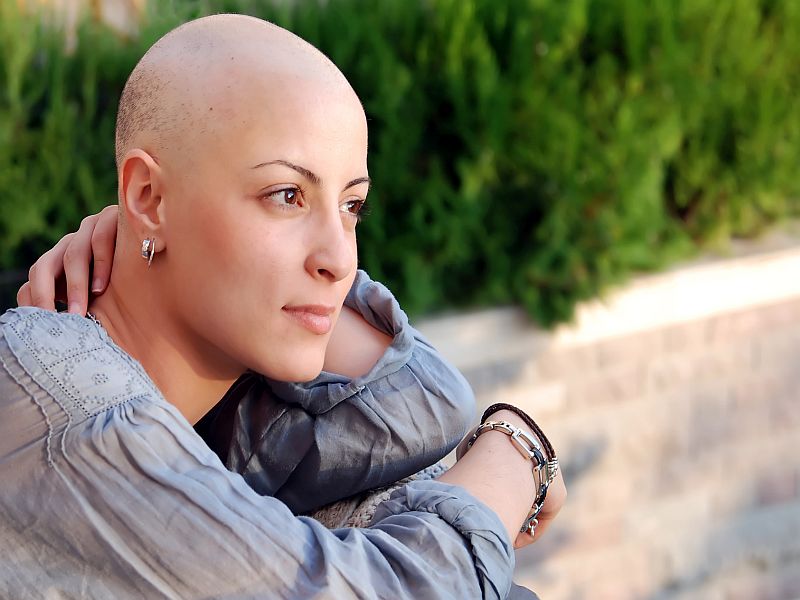| FEATURED NEWS |
| New Way to Stop Cancer's Spread |
Research shows a way to destroy cancer cells that travel to other parts of the body.Blood Test Gives Quick Prognosis for Lymphoma Treatment: Study Many cancers become especially dangerous only when they spread (metastasize) from the initial location to other tissues such as the lungs, brain or bone, the University of Colorado Cancer Center researchers explained.WEDNESDAY, Aug. 22, 2018 (HealthDay News) -- Scientists say they're researching a way to destroy cancer cells that travel to other parts of the body.
The investigators found that when a crucial part of cellular recycling is turned off in metastatic cancer cells, they can't survive the stresses of traveling through the body.
"Highly metastatic cells leave their happy home and have all these stresses on them. One way that the cell is able to deal with stresses is through disposing of cellular wastes or damaged cell components and recycling them," study co-author Michael Morgan said in a university news release.
"When we turn off the activity of cellular structures called lysosomes, which a cell uses to do this recycling, the metastatic cells become unable to survive these stresses," Morgan explained.
Morgan was an assistant research professor at CU Cancer Center during the study. He is now assistant professor of biology at Northeastern State University in Oklahoma.
The study was published online Aug. 20 in the Proceedings of the National Academy of Sciences.
-- Robert Preidt
 Copyright © 2018 HealthDay. All rights reserved.
CONTINUE SCROLLING FOR NEXT NEWS ARTICLE
SOURCE: University of Colorado, news release, Aug. 20, 2018
Radiation for Childhood Brain Tumor Can Hinder Memory By Maureen Salamon By Maureen SalamonHealthDay Reporter
TUESDAY, Aug. 21, 2018 (HealthDay News) -- Radiation therapy for the most common childhood brain tumor can cause memory problems, new research suggests.
Specifically, it can leave young survivors struggling to create memories of recent personal events, the small study found. But survivors' ability to recall ones that happened before radiation wasn't affected.
"There are some known cognitive effects from radiation treatment, including short-term memoryloss and difficulties in school, but no one had really looked at this retention of biographical information," said study author Melanie Sekeres.
"But it was surprising that previously acquired memories, which children had before treatment, were preserved," Sekeres added.
She's an assistant professor of psychology and neuroscience at Baylor University in Waco, Texas.
Medulloblastoma, the most common childhood brain cancer, is diagnosed in between 250 and 500 children in the United States each year. Radiation is typically a major part of treatment. While it has helped boost survival rates, it also affects the developing brain.
Sekeres and her colleagues looked at 12 medulloblastoma survivors and one survivor of an ependymoma, another childhood brain tumor. All had been treated with surgery, followed by radiation and chemotherapy. They were compared with nine healthy children. All were between ages 7 and 18.
The researchers asked the children to recall two memories -- one of an event from the past month and another from as long ago as they could remember. Brain tumor survivors recalled far fewer details of the recent event, such as time and place, than the healthy children.
Sekeres said radiation may hinder growth of nerve cells in the hippocampus, a brain area responsible for memory.
"Even though the reduced volume of the hippocampus may be a leading reason, we do see brain-wide changes" that could contribute to the children's memory problems, she noted.
Sekeres said more research is needed to learn how the hippocampus works in children who have had brain radiation. Other studies have identified exercise as a way to promote nerve cell growth in this part of the brain, she said, and it could be used to help affected children.
"Something that's positive is that the kids do seem to retain some of their early life memories -- it's not a complete impairment across the life span," Sekeres said.
Dr. Matthew Ladra, director of pediatric radiation oncology at the Johns Hopkins Kimmel Cancer Center at Sibley Memorial Hospital in Washington, D.C., reviewed the findings.
He praised the study for "taking our understanding to the next level regarding these memories of details and a more descriptive measure of memory loss."
Ladra agreed with Sekeres that more research is needed. He said a next step is to determine what rehabilitation tools and techniques might help young survivors improve thinking skills affected by radiation treatment.
"Some medications can help, and there are ways to train your brain to be more engaged and to actively participate in the memory-making process, which increases the number of memories retained," Ladra added.
The study was published Aug. 20 in the JNeurosci journal of the Society for Neuroscience.
 Copyright © 2018 HealthDay. All rights reserved.
CONTINUE SCROLLING FOR NEXT NEWS ARTICLE
SOURCES: Melanie Sekeres, Ph.D., assistant professor, psychology and neuroscience, Baylor University, Waco, Texas; Matthew Ladra, M.D., M.P.H., director, pediatric radiation oncology, Johns Hopkins Kimmel Cancer Center at Sibley Memorial Hospital, Washington, D.C.; Aug. 20, 2018, JNeurosci, the journal of the Society for Neuroscience
When a Parent Has Cancer, Kids Suffer Long Term: Study The study included more than 1 million people born in Denmark from 1978 through 1999. Before their 18th birthday, about one in 20 had a parent diagnosed with cancer.TUESDAY, Aug. 21, 2018 (HealthDay News) -- Children whose parents have cancer are more likely to struggle in school and to have lower incomes as adults, a new Danish study suggests.
By age 15, those kids had lower grade averages in school than their classmates, the findings showed. Grade averages were lowest among children who had a parent die of cancer or who had low odds of surviving five years.
Parental cancer was also associated with a lower level of educational attainment in children, particularly if the father had cancer. This risk was 1.5 times greater if the chance of a parent surviving five years was poor, and 1.6 times greater if the parent had died.
By age 30, adults with a childhood experience with parental cancer were more likely to earn less than others, especially if the parent had low five-year survival odds or died, according to the report.
Children who were under age 5 when the parent was diagnosed appeared to be at greatest risk of problems. That suggests the impact of parental cancer in early childhood may be lasting.
"In a life course perspective, parental cancer in childhood could be considered as a potential early life stressor that may increase the health vulnerability to later life exposures, expanding the risk of later social disadvantage and poor adult health," the researchers, led by Anne Cathrine Joergensen of the University of Copenhagen, wrote.
However, the researchers could not prove a cause-and-effect relationship.
The findings "may indicate that some children who experience parental cancer would benefit from appropriate support and early educational rehabilitation in [their] teenage years," the study team concluded.
The study was published Aug. 20 in the Journal of Epidemiology & Community Health.
One in three people will be diagnosed with cancer during their lives, and it's estimated that one in every six cancer survivors lives with children, the researchers noted in a journal news release.
-- Robert Preidt
 Copyright © 2018 HealthDay. All rights reserved.
CONTINUE SCROLLING FOR NEXT NEWS ARTICLE
SOURCE: Journal of Epidemiology amp; Community Health, news release, Aug. 20, 2018
HPV Test May Replace Pap for Some Women, New Guidelines Say By Serena Gordon By Serena GordonHealthDay Reporter
TUESDAY, Aug. 21, 2018 (HealthDay News) -- The Pap smear has long been the gold standard for cervical cancer screening, but an expert panel now says the HPV (human papillomavirus) test is also an option for women over 30.
These women now have three choices under new recommendations issued by the U.S. Preventive Services Task Force (USPSTF):
The task force also recommended a Pap test alone every three years for women between the ages of 21 and 29.
"It's very important for all women to get screened for cervical cancer. Screening can reduce deaths from cervical cancer," said Dr. Douglas Owens, vice chair of the USPSTF.
"There are three good options for screening for cervical cancer in women 30 to 65. Our recommendation is that women have a conversation with their clinician about which option is best for them," Owens added.
A Pap test looks for changes in cells from the cervix that indicate cancer or precancerouschanges, according to the U.S. Office on Women's Health. The HPV test looks for evidence of the virus in cells, but not for cancerous changes, according to the American Cancer Society (ACS).
Almost all cases of cervical cancer are caused by high-risk HPV infections, according to background information in the recommendations. Both tests use samples collected from a woman's cervix. A woman won't be able to tell a difference in the tests, the ACS said.
The task force didn't recommend HPV testing or co-testing for younger women.
Debbie Saslow, senior director of HPV-related and women's cancers for the ACS, explained why it's not a good idea to test for HPV in women under 30. "Almost everybody gets HPV, but more than 99 percent of the time, HPV goes away on its own. If you test for HPV in younger women [before the infection has a chance to clear on its own], it would be unnecessarily alarming," she said.
Dr. George Sawaya, author of an editorial accompanying the new recommendations, agreed.
"HPV testing sooner [than age 30] will lead to more 'false alarms,'" he said. "In other words, some women will have invasive diagnostic procedures and be found to have no cervical problem." Sawaya is a professor of obstetrics and gynecology at the University of California, San Francisco.
The task force also made recommendations about who doesn't need cervical cancer screening. This included women under 21, women who've had a hysterectomy that included removal of the cervix, women aged 65 and older who have had adequate screening in the past and aren't at a high risk of HPV.
Saslow said the most important message women need to take away from the new recommendations is simple: get screened.
"Most cervical cancer is in women who don't ever get screened or who get screened rarely. Whatever test is available to you, get screened. If you have a choice, and you're over 30, ask for an HPV test," she suggested.
Sawaya concurred. "Regardless of the method used for screening, the most important thing for women is to have easy access to affordable screening," he said.
Saslow also pointed out that young people should be sure to get the HPV vaccine if they didn't get it in their pre-teen years. Men and women can get the HPV vaccine up until age 26, though younger is better, she added.
The new recommendations were published in the Aug. 21 issue of the Journal of the American Medical Association.
 Copyright © 2018 HealthDay. All rights reserved.
CONTINUE SCROLLING FOR NEXT NEWS ARTICLE
SOURCES: Douglas Owens, M.D., vice chair, U.S. Preventive Services Task Force, professor, medicine, Stanford University, and physician, VA Palo Alto Health System, California; Debbie Saslow, Ph.D., senior director, HPV-related and women's cancers, American Cancer Society; George Sawaya, M.D., professor, obstetrics and gynecology, and reproductive sciences, epidemiology and biostatistics, University of California, San Francisco; Aug. 21, 2018, Journal of the American Medical Association
Blood Test Gives Quick Prognosis for Lymphoma Treatment: Study Latest Cancer News
TUESDAY, Aug. 21, 2018 (HealthDay News) -- A blood test can predict which lymphomapatients will respond well to normal treatment and which may need a more aggressive approach, researchers report.
Their study included 217 patients with diffuse large B cell lymphoma, the most common type of the blood cancer non-Hodgkin lymphoma.
The blood test checks levels of circulating tumor DNA (ctDNA) in patients before and after therapy. It could tell doctors within days or weeks how a patient is responding to treatment, removing the need to wait five or six months for therapy to end, according to the researchers.
"Although conventional therapy can cure the majority of patients with even advanced B cell lymphomas, some don't respond to initial treatment," said study co-senior author Dr. Ash Alizadeh, an associate professor of medicine at Stanford University.
"But we don't know which ones until several months have passed. Now we can predict nonresponders within 21 days after the initiation of treatment by tracking the levels of ctDNA in a patient's blood. We can look earlier and make a reliable prediction about outcome," Alizadeh explained in a university news release.
Dying cancer cells release circulating tumor DNA into the blood. It can provide important information about the course of the disease and the effectiveness of therapy.
Previously, researchers found that tracking ctDNA can predict lung cancer recurrence weeks or months before a patient has clinical symptoms.
The new findings "confirm the value of tracking cancer genetics in the blood in real time," Alizadeh said. "We are thinking about how to use the tools to best benefit patients, and are very excited to test this approach in other types of cancers."
The study was published Aug. 20 in the Journal of Clinical Oncology.
-- Robert Preidt
 Copyright © 2018 HealthDay. All rights reserved.
SOURCE: Stanford University, news release, Aug. 20, 2018
|
মন্তব্যসমূহ
একটি মন্তব্য পোস্ট করুন